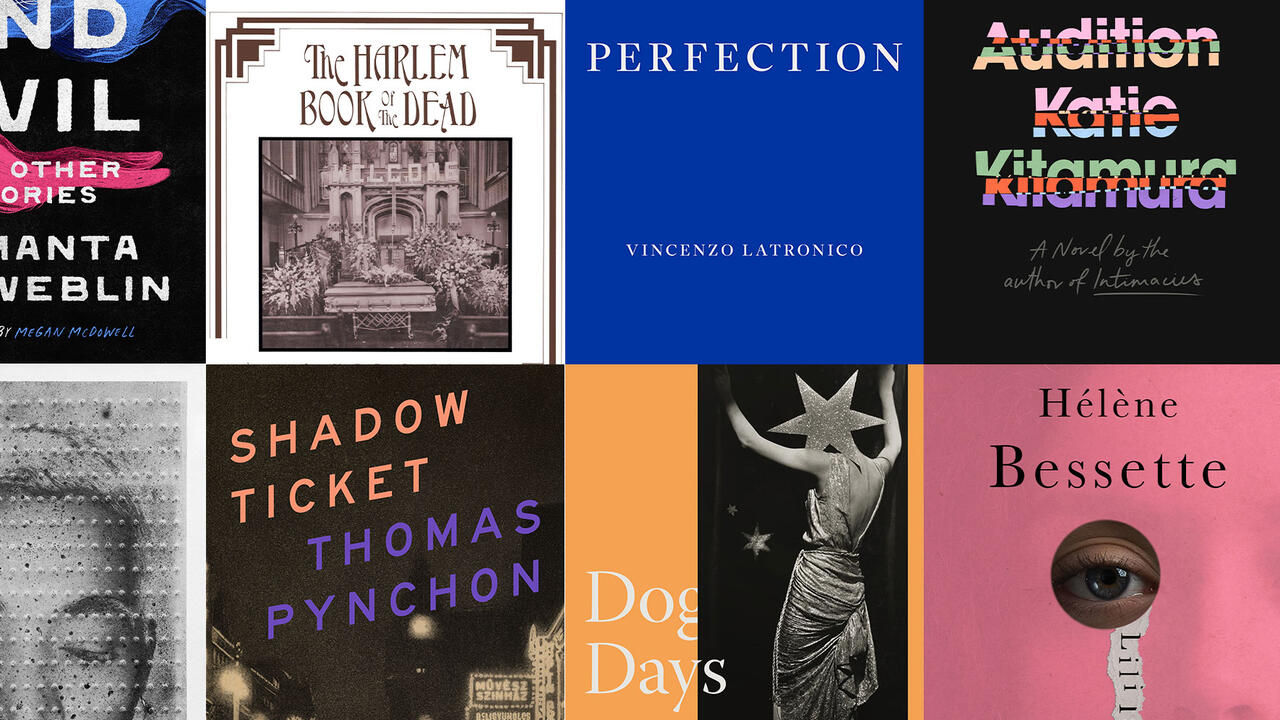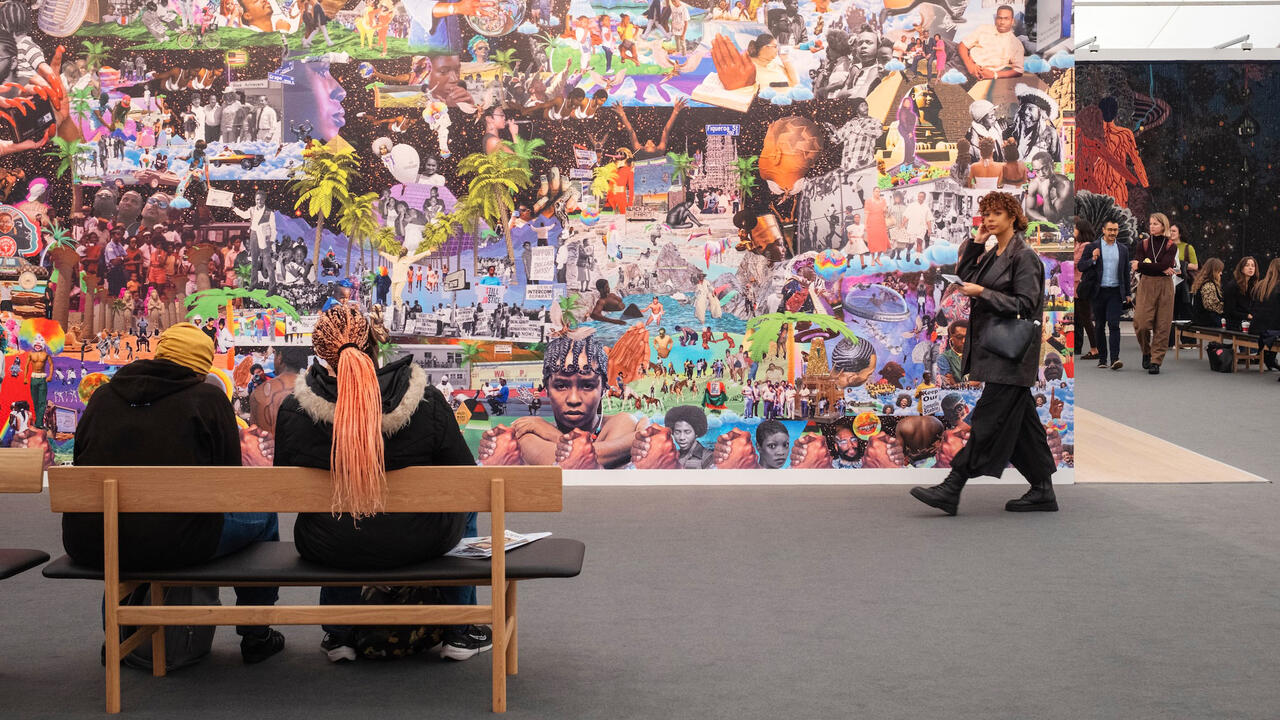RothStauffenberg
Esther Schipper, Berlin, Germany
Esther Schipper, Berlin, Germany

We tend to consider film an autonomous medium, even though a film isn’t necessarily a compact object that can stand on its own. The projection glowing on the screen defies the haptic promise of a sculpture, painting or photograph. Movies cannot be reduced to the reels, projectors or plush theatre seats, let alone to the countless objects necessary for production, although these elements are essential to the cinematic experience. For Christopher Roth and Franz von Stauffenberg – who have been working as RothStauffenberg since the early 1990s – what’s glowing on the screen seems to be the least interesting part of cinema. In the past, the duo has created set-like interiors for movies that don’t exist and yet seem to be unfolding right before one’s eyes, as if an installation alone could mimic a filmic atmosphere. It seems appropriate that their latest exhibition ‘Cartes Postales’ (Postcards) includes not only a film, Der Königreich von Mozartbique (The Kingdom of Mozartbique, 2009), but also some props, the film’s script (published as an illustrated booklet) and an entire movie theatre, Mobile Cinema (2009) – a ready-to-move construction complete with reclining chairs built from canvas, wood and twine.
While its title invokes an itinerary, ‘Cartes Postales’ would be hard to chart with a single line. In 2006, the artists travelled to Beira, Mozambique, and ended up spending a lot of time at the Grande Hotel, though not as guests. The hotel, which opened as a casino resort in 1954 when Mozambique was under the colonial rule of Portugal, is now home to 3,000 squatters, including in-house security, a witch doctor and a theatre troupe that performs plays about AIDS prevention. Travelling with a film crew and an impressive collection of masks, RothStauffenberg invited the troupe to work with the masks instead of filming the squatters for documentary fare. The resulting play – an improvisation that winds through the hotel’s crumbling corridors – evokes both colonization and independence, albeit with classic Venetian carnival disguises, Hollywood horror masks and comic figures. A white teacher preaches to an unruly punk, only to be attacked later by monster thugs; there’s a formal visit with a grande dame sporting a neon-blonde hairdo; the witch doctor cures a rebel with a bottle of scotch (the bottle, not the drink).
But this improvisation is only one part of the trip. The term ‘Cartes Postales’ was coined by the French filmmaker Jean Rouch to describe the films he made in Mozambique shortly after independence in 1975, which functioned as postcards sent and received by citizens who could not yet read and write but who wanted to participate in their liberation as actors and spectators. Rouch was part of a group of directors, including Jean-Luc Godard and Shin Jun-chul, who were invited by Mozambique’s first president, the Marxist Samora Machel, to make films for the newly founded Instituto Nacional de Cinema (INC) about the fledgling nation-state, which still lacked a television station. RothStauffenberg’s Mobile Cinema recalls the outdoor movie theatres that were set up to screen INC newsreels across the country during the 1970s – a history documented in Margarida Cardoso’s film Kuxa Kanema: The Birth of Cinema (2003). While including black and white clips from the newsreels, RothStauffenberg’s film also includes a visit to the INC, where officials helplessly frown at the canisters rusting away in the archives.
The Grande Hotel improvisation, the multiple histories of Mozambique and the dizzying flow of black and white and colour clips are accompanied by a chorus of voice-overs: six characters – from Radio to Cameraman – add more threads of politics, theory and fiction instead of weaving everything neatly together. RothStauffenberg, who question the compact finality of any film, choose to show their own in continually changing edits. A screening programme also features works by Rouch and others in the Mobile Cinema. ‘Mozartbique’ in the film’s title reflects not only the fusion of European and African cultures, present and past, but also the similarity between the class struggle in Mozart’s pre-revolutionary opera Le Nozze di Figaro (1786) and Mozambique’s colonial struggle. A squatter couple, wearing silver eye masks while ambling through the decrepit hotel lobby to the tune of a Mozart aria, re-embody the fiancés Figaro and Susanna. ‘Marxists don’t believe in fiction,’ says the Cameraman, although it’s clear that uncovering these masks would not lead to the truth, but to another kind of fiction, proper to the genre of documentary. RothStauffenberg diffuse that elusive filmic truth into a shared experience, crossing times and cultures. Indeed, viewers in the Mobile Cinema in Berlin re-embodied the liberated Mozambicans who watched films in the INC open-air cinemas in the 1970s. Ultimately, film might just be something best experienced not with the eyes, but by the seat of one’s pants.



















